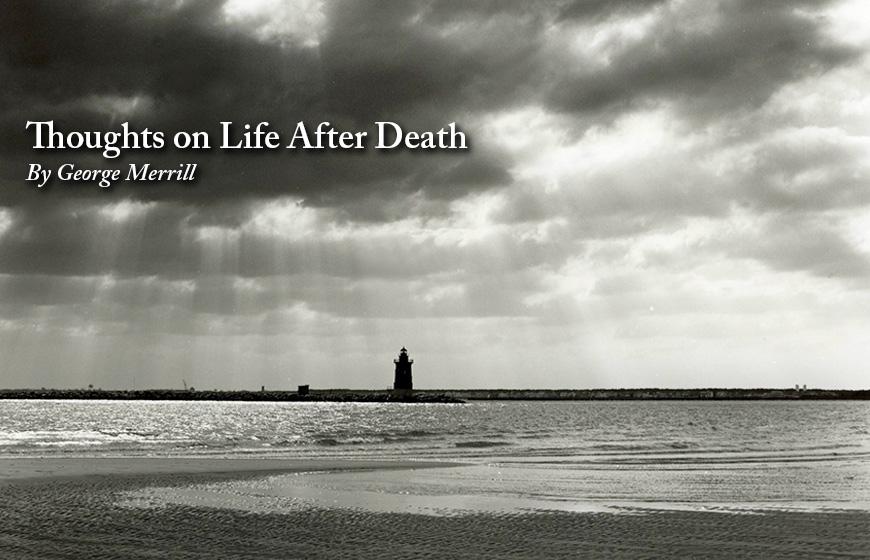I attended a friend’s funeral recently. It fell a few days before the anniversary of my mother’s birthdate. It set me thinking about life after death.
I recall as a young boy, on sultry summer days, how I hung around my house. There were fewer cars then and rides to beaches and ponds nearby were harder to come by. Outside the house there were two large sycamore trees. On hot days I’d lie on the grass between them. I stayed cool in the shade, but I could still see the cloud formations morphing above. I imagined they were the souls of those who’d recently died. They were waiting to enter heaven. I saw men and women, but mostly sheep and old men with long beards. Heaven, as it seemed to me in those days, did not want for candidates. I could see the queues were always long with newcomers of every description arriving each minute. I couldn’t tell what went on up there during overcast days.
I don’t see the deceased in cloud formations anymore, but I am of an age now when I see many of my contemporaries dying. I again ponder the thought of a life after death.
In traditional Christianity, bodily resurrection is taught routinely and I grew up with the teaching.
Between my eleventh and fifteenth year I lost six close relatives. Since my mother and father were only children, all my close relatives were grandparents or great uncles and aunts. Their deaths through aging were natural, but I felt troubled at my losses. My friends, whose uncles and aunts were their parents contemporaries, lived longer than my relatives. I felt cheated.
I would pray every night that God would not forget my relatives and care for them. It was a matter of staying connected to them with God serving as the intermediary. I was dutiful about this for a number of years until my memory of my loss dimmed and I gave little thought to the matter.
As I look back on how my own feeling about this changed over the years, I recall how rarely this topic was ever openly discussed. When I conducted funerals, the scriptures gave assurances of life after death, but I cannot recall any in-depth conversation in which I engaged another in all the nuances of a life after death. Among the intimate discussions I have had with close friends, life after death wasn’t among them. I believe the subject is a delicate one for others as it has been for me. It remained safer to leave the matter as an assumption rather than examining how one feels about life after death.
I had seen my friend days before she died. She was ready to go and fearless and although she was only a casual churchgoer, she asked me to offer a prayer for her. Then she talked about the death of her own mother and recollections she had of other intimate losses in her life. I sensed her tendency to see in her death an occasion for reconciliation with loved one’s she’d lost. Had I asked her straight out whether she believed in a resurrection she’d probably have said no. However, she had strong feelings that in her death she’d be united with those who had passed on before.
I’ve heard this said by many dying people even though the issue of an afterlife never came up explicitly. The deep emotional import of the matter for many seems to be the continuity of life, not the finality of death.
My spiritual rearing as a Christian put the issue of life after death on the table for me. When I was much younger I assented to the idea of a life after death, but it remained vague. The idea of bodily resurrection grew less credible as life taught me its harder lessons of loss. That life continues after physical death came together for me only recently, not from reading religious and spiritual material, but a scientific piece. The article stated simply that matter is neither created nor destroyed, but is transformed. In that I found a credible metaphor to understand a feeling I’ve always had about a life after death, without violating the reasons of my mind or my heart.
Buddhists maintain that our birth date is our ‘continuation day.’ We are the product of ongoing transformations before we were ever manifest in our bodies and continue so after physical death.
Maybe my childhood fancy in watching clouds morph in the sky affords me a good handle for this mystery I call life. Clouds manifest in the sky when water is present in the atmosphere in certain quantities. Clouds appear at the fullness of a particular time. They seem to disappear, but actually have only transformed to manifest themselves again in another time and place when the conditions are right. The clouds are not gone. They are transformed.
Columnist George Merrill is an Episcopal Church priest and pastoral psychotherapist. A writer and photographer, he’s authored two books on spirituality: Reflections: Psychological and Spiritual Images of the Heart and The Bay of the Mother of God: A Yankee Discovers the Chesapeake Bay. He is a native New Yorker, previously directing counseling services in Hartford, Connecticut, and in Baltimore. George’s essays, some award winning, have appeared in regional magazines and are broadcast twice monthly on Delmarva Public Radio.



Write a Letter to the Editor on this Article
We encourage readers to offer their point of view on this article by submitting the following form. Editing is sometimes necessary and is done at the discretion of the editorial staff.